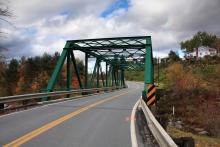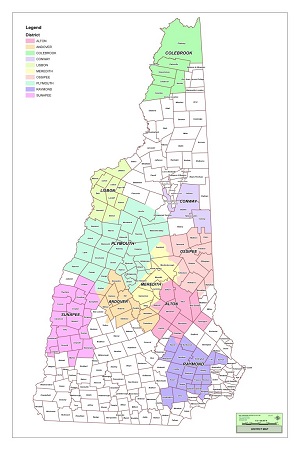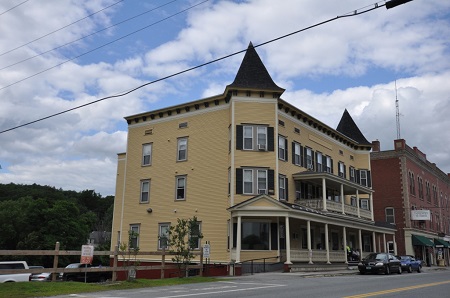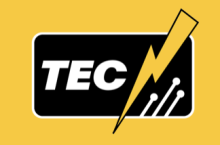
After receiving $50 million in new federal funding, the New Hampshire Electric Cooperative (NHEC) has begun a major expansion of its fiber network across large swaths of the state, providing many long-frustrated rural residents access to ultra-fast, affordable broadband for the first time ever.
NHEC currently provides electricity to 88,000 largely rural homes and businesses across 118 New Hampshire communities. In October of last year, NHEC received a $50 million grant from the New Hampshire Business and Economic Affairs Department, made possible by the American Rescue Plan Act (ARPA).
“NHEC is a member-owned, nonprofit electric cooperative and our business is providing essential services to rural New Hampshire,” NHEC President/CEO Alyssa Clemsen Roberts said after the grant infusion. “We welcome the opportunity to provide much-needed high-speed internet to the same areas that NHEC first electrified more than 80 years ago. Grant funding is helpful to our plans to reach all underserved members, and we are grateful for the trust placed in us by the BEA to get the job done.”
That money is being used to shore up NHEC’s growing expansion into broadband access via NHEC's wholly owned subsidiary, NH Broadband. NH Broadband began planning its expansion into broadband in 2019, buoyed by another $6.7 million grant made possible by the CARES Act and the Connecting New Hampshire Emergency Broadband Program.

NHEC spokesman Seth Wheeler told ILSR that the initial CARES Act grant helped the company deliver affordable fiber access to 1,500 NHEC subscribers in six towns. The new $50 million grant will supercharge a cooperative effort by NH Broadband to expand that broadband access to 15,000 current NHEC electricity customers.
Wheeler says NH Broadband is getting some notable help from Connexon, which is helping with network design, construction, customer service, and the billing of residential and business customers. NHEC is also busy migrating their legacy customers onto the Connexon platform, as it also helps them conduct a staged rollout of service into Grafton County.

“We're already connecting our first members in Grafton County here in New Hampshire,” Wheeler said. “It's one of the more underserved parts of the state. There's a disproportionate number of members there that are either unserved or underserved. So over this next year, we're going to be building-out to 31 towns in Grafton County, passing about 17,000 locations.”
Over the next three years, the ARPA grant will allow NHEC to deliver fiber to 23,000 members in 73 towns, and the cooperative has previously stated that it hopes to deliver fiber broadband to the majority of its 88,000 current electrical customers by the end of 2026.
“It's daunting. I'll say that much,” Wheeler said. “That's a big project for us. We're not a huge utility here. And so our partnership with Connexon has been great.”
A Revolution In Affordable Access For Long Neglected Rural Residents
As with other similar efforts by cooperatives and city-owned utilities, it’s hard to not notice the direct parallels between NHEC’s efforts and the early electrification challenges that faced rural America. NHEC was founded in 1939 with a very similar mission to shore up access to an essential utility rural Americans deemed unworthy of modernization by industry.
“It really harkens back to those days that we were providing light and power there for those same areas, you know, 85 years ago because no one else would,” Wheeler said.
Back then, passing a rural New Hampshire home with electrical service cost somewhere between $2000 to $3000. Unsurprisingly NHEC, which installed electrical service and offered 95 percent financing with 6 percent interest paid back on the electric bill, quickly became popular.
Fast forward to 2023 and NHEC’s broadband service plans and pricing are a dramatic improvement over the rates offered by regional telecom monopolies, even in far more populous and profitable areas.
NH Broadband currently offers three fiber tiers: $50 a month for symmetrical 100 Megabit per second (Mbps) service, $80 for symmetrical gigabit per second (Gbps) service, and $100 for symmetrical two Gbps service.
“We're a nonprofit co-op and we're here to serve our members and we're installing every member for free,” Wheeler said.
In addition to no installation charge, all service tiers have no usage caps or overage fees. NHEC also offers users voice service for $30 if they bundle fiber broadband, or $40 a month standalone. Users also have the option of paying $5 extra a month if they want Wi-Fi access using an NHEC managed wireless router.
Wheeler was quick to note that the excitement among locals has been palpable, especially among those who’ll be getting reliable and affordable access for the first time ever.
“We saw the current providers not really investing in reaching these people. And our members came to us in 2020 and voted to change our bylaws to add internet service as a function of the cooperative. It's basically a mandate. And so, we set out to go do that.”
As with other utilities and cooperatives, the fiber expansion will also deliver notable improvements to overall system reliability, maintenance, and network management, integrating tightly with smart metering technology installed nearly a decade ago.
NHEC, Consolidated Key Cogs In New Hampshire Digital Divide Efforts
NHEC’s efforts are just one part of a broader state attempt to bridge the digital divide in a state ranked 23rd in the country when it comes to access to affordable broadband.
In 2020, New Hampshire received $16 million in CARES Act money to fund 16 projects bringing affordable broadband access to more than 4,500 state homes and businesses. The state has also doled out roughly $122 million in ARPA broadband deployment funds.
Consolidated Communications was awarded $40 million in APRA money last February with the goal of expanding broadband to 25,000 homes across New Hampshire. Consolidated says it will use its own capital to deploy broadband access to another 32,000 homes, with a total broadband footprint of more than 57,000 homes across six counties by the end of 2024.
In 2018, the New Hampshire legislature passed SB 170, which allowed municipal governments to bond in order to build broadband infrastructure in places not served by commercial broadband providers. Numerous municipalities then struck public private partnerships with Consolidated to drive affordable fiber into long neglected regions of the state.

Between Consolidated, NHEC, and other projects, state leaders are hopeful to see a major shift toward widespread, affordable broadband access by the end of 2026.
"By the time we get done with these resources, we expect to have a very significant portion of the unserved and underserved locations in the state up to speed and online," Taylor Caswell, commissioner of the Department of Business and Economic Affairs, said in a video news conference last month.
Unlike many states, where the lion’s share of money is being thrown at regional telecom monopolies with a long history of undermining competition or receiving massive subsidies for half-completed networks, New Hampshire has prioritized funding a cooperative that’s simply keen on finally getting the job done.
“If there are some people in our service territory that can be easily reached by a cable provider, then that's great–just get 'em a connection,” Wheeler told ILSR.
Header image of the Ammonoosuc River Bridge in Grafton County, NH courtesy of Flickr user cmh2315fl, Attribution-NonCommercial 2.0 Generic (CC BY-NC 2.0),
Inline image of Old Lisbon Inn in Lisbon NH courtesy of Wikimedia Commons, Attribution-ShareAlike 3.0 Unported (CC BY-SA 3.0)







